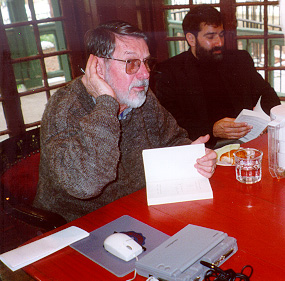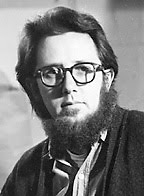Note: Robert Creeley was a Kelly Writers House Fellow in April 2000. I conducted a public interview and moderated a discussion on April 11 before an audience of eighty people. The recording (both video and audio) of the interview has been available both on the Kelly Writers House site and at PennSound. Recently Michael Nardone transcribed it. We expect to publish the entire transcript in Jacket2 before too long. Meantime, below we present the portion of the discussion in which I ask Creeley about William Carlos Williams.
Al Filreis: Now back to Williams, your initial response to Williams — according to something you said at Camden in December [1999] — was that what mattered to you in reading Williams, particularly The Wedge, was that the work was driven by anger. This is what, at least, Ron Silliman posted to the Buffalo poetics listserv afterwards. And then he went on to comment on how Williams had a huge impact on him as well, but it was a very different Williams. So, if anger is not quite operating as much, what’s your Williams now? How does Williams animate you now?
 Robert Creeley: Back to Ron’s point, that that wasn’t the Williams he read, he reads the later Williams.
Robert Creeley: Back to Ron’s point, that that wasn’t the Williams he read, he reads the later Williams.
Filreis: The Desert Music.
Creeley: Yeah. Which is not an unangry poem, so to speak. But it certainly isn’t nearly as angry as the poems he was writing in the thirties or twenties. Spring and All, for example. Or The Descent of Winter, or “March First.” Many of the early poems are really angry, and their emotional base is their revulsion and anger at the world he finds around him.
Filreis: So, now when you look back at Williams, how does it feel?
Creeley: Well, it feels very much like my own life. I, when young, felt a dismay, let’s put it, that such things as the Holocaust or the Second World War or the Depression or many other factors in one’s real life, that these could be so unremarkable to the body politic, that it seemed not to matter.
Ted Berrigan interviewed by Hejinian and Robinson
On "In the American Tree," 1978
August 11, 1978. On the radio program, "In the American Tree: New Writing by Poets," Lyn Hejinian and Kit Robinson are our hosts, and the guest is Ted Berrigan. A PennSound recording of the show is available, and here--thanks to the work of Michael Nardone--is part of the transcription:
 These fifty poems are, fifty was an arbitrary number I decided upon ahead of time based on a theory that if you do two or three works that are fairly similar, and that you liked them, even if you just do one, you do one work and you like it and do another one that’s similar to it, there’s no particular reason to do the next one, a second one, and there’s no particular reason not to do it. But if you feel you have a number then there, you can set yourself this arbitrary number and just decide, well, I’ll do fifty of these. Then you’re sort of clear as to what you’ll be doing for a while. I got this idea from a painter friend of mine.
These fifty poems are, fifty was an arbitrary number I decided upon ahead of time based on a theory that if you do two or three works that are fairly similar, and that you liked them, even if you just do one, you do one work and you like it and do another one that’s similar to it, there’s no particular reason to do the next one, a second one, and there’s no particular reason not to do it. But if you feel you have a number then there, you can set yourself this arbitrary number and just decide, well, I’ll do fifty of these. Then you’re sort of clear as to what you’ll be doing for a while. I got this idea from a painter friend of mine.
- - -
HEJINIAN:
We’re going to continue on now with our guest Ted Berrigan. This is "In the American Tree: New Writing by Poets."
Ted, you have a sequence of poems?
BERRIGAN:
Yeah, I’ll read three poems from a book, which I just completed, I completed it three or four months ago, it’s called Easter Monday, and it’s fifty poems. And they’re all, most of them are close to the same size, which is about, well, my favorite size, which is about 14 lines. Well, they are sonnets, in fact, but they don’t really work at that too much. Not all of them are. Some are longer. None are shorter, but some are quite long, quite a bit longer, because they just got longer sometimes, and when they did I just let them be longer.
So, I did fifty of these, and it took me a lot longer than I thought it would. I said that I would do fifty. It’s called Easter Monday because it’s really about second life, life beginning about the age of 40. And since it is personal, I mean it is the second half of one’s life, it’s about being young, a young older person. I was involved in a second marriage, second family, but even if I hadn’t been, it still could have been the same thing.
Consequently, it is like Easter Monday. Easter Friday you die. Easter Sunday you rise again from the dead and that’s really glorious and wonderful, but then Easter Monday you have to get this job and support yourself for the rest of your life.
The poems were all written in two or three or four years from the time I was 38 until last year when I was 42. So they are not all about one’s whole second life, but rather about being aware of coming into that.
When I say they are about something, I mean, I strictly mean “about”. I don’t know what each poem is about particularly. I could study them and tell you what each one is about, but that’s not what I’m willing to do.
Each poem is a very separate poem. They are not like my work The Sonnets where, although every poem can stand on its own, they were sequential and serial in a certain way. There is some repetition of things, but it’s really like fifty separate works which were done knowing I was going to do fifty, and therefore they relate that way. Now, I knew what the themes were, though I didn’t work at them too hard. I just knew what they were.
This is the first three. The first one is called “Chicago Morning.” It’s dedicated to the painter Phil Gustin simply because I was looking at a painting of his while I was writing because it was hanging on the wall over the typewriter, and so I actually used some things in his painting to refer to when I couldn’t think of anything else to say.